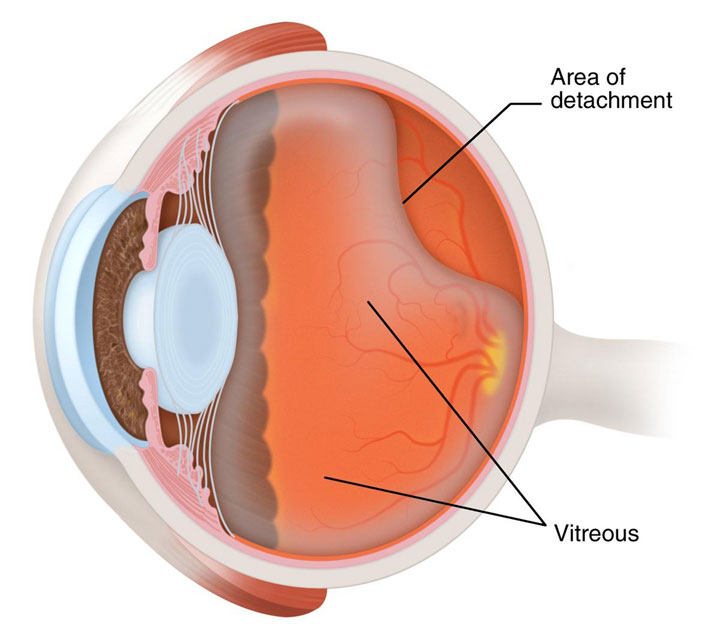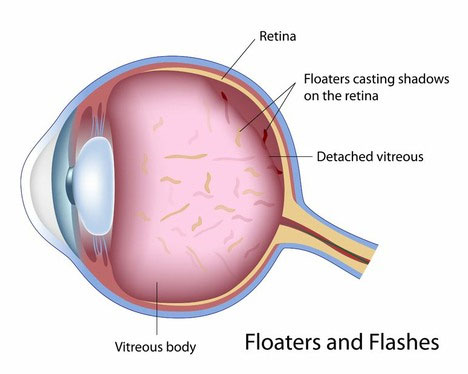Flashes and Floaters
Migraines
Some people experience flashes of light that appear as jagged lines or “heat waves” in both eyes lasting for 10-20 minutes. These types of flashes are usually caused by a spasm of blood vessels in the brain, called a migraine.
If a headache follows the flashes, it is a migraine headache. However, these flashing light symptoms can occur without a headache. In this case, the light flashes are called ocular migraine or “visual migraine”.
What to Expect from The Eye Examination?
The examination will involve your pupils being dilated. This is a painless process and your ophthalmologist will then observe your retina and vitreous.
Due to the enlargement of your pupils, you may either wait 1 hour for the pupils to return to normal or you will need to make arrangements for someone to drive you home afterwards
Flashes and floaters become more common as we get older. To be safe, you should always have a medical check by an ophthalmologist to ensure there is no damage to your retina.

What Causes Floaters?
When people reach middle age, the vitreous gel may shrink or thicken which forms clumps or strands inside the eye.The vitreous gel pulls away from the back wall of the eye, causing a posterior vitreous detachment. This is a common cause of floaters.
Posterior vitreous detachment commonly occurs in people who:
- are nearsighted
- have undergone cataract surgeries
- have had YAG laser surgery of the eye
- have had inflammation inside the eye
The sudden appearance of floaters can be alarming and you must contact an ophthalmologist immediately, especially if you are 45 years of age and over.
Are floaters serious?
The retina tears if the shrinking vitreous gel pulls away from the wall of the eye. As a result, it may cause a small amount of bleeding in the eye that appears as new floaters. This can indicate a torn retina which can lead to a retinal detachment. See your ophthalmologist immediately if
- a new floater appears suddenly
- see sudden flashes of light
- loss of side vision
What Are Floaters?
Floaters are seen as small dark or transparent specks moving in your field of vision. Often you can see them when looking at a plain background such as a blank wall or blue sky. In fact, floaters are tiny clumps of gel or cells inside the vitreous, the clear jelly-like fluid that fills the inside of your eye.
Floaters can have different shapes such as circles, little dots, lines, clouds and cobwebs.
While these shapes look like they are at the front of your eye, they are floating inside. What is seen are the shadows they cast on the retina, the nerve layer at the back of the eye that senses light and allows you to see.

Treatment
An examination is needed urgently if new floaters appear suddenly.
Floaters can get in the way of clear vision and particular activities such as reading. You can move your eyes by looking up then down to move floaters out of the way.
While some floaters may remain in the way of your vision, many will fade over time and become less noticeable. Even if you have had some floaters for years, an eye examination must be organised ugrently if you notice new floaters.
What Causes Flashing Lights?
When the vitreous gel rubs or pulls on the retina, it may seem like you are seeing flashing lights or lightning streaks. This is similar to the sensation of seeing stars, if you have ever been hit in the eye. The flashes of light can appear and disappear for several weeks or months. As we age, it is more common to experience flashes. As mentioned, this may indicate a torn retina and you should see your ophthalmologist urgently if these symptoms occur.
Booking an appointment
You will require a valid referral to claim your consultation fee and associated investigations from Medicare. Referrals from your GP or Optometrist are valid for 12 months, however specialist referrals are only valid for 3 months.
If you require any specific information regarding your eye problem, for example cataract or glaucoma consultations, we ask you kindly ring your desired practice for fees and further information.
Urgent Appointments
If you have any urgent query or problem, we request that patients or referrers ring the practice directly and speak with a staff member. We will always do our best to accommodate for urgent referrals, or direct you in the best possible manner.
How to reach us?
Dr Brian Chua's primary consulting locations are St Vincent's Clinic and Gordon Eye Surgery.
Please ring us if you require any further information or wish to book an appointment.
St Vincent's Clinic Ophthalmology
Level 10 Suite 1006
438 Victoria Street
Darlinghurst NSW 2010
Ph: 02 8382 6030
Fax: 02 8382 6031
Email: eyedocs1006@stvincents.com.au
Gordon Eye Surgery
2/741 Pacific Highway
Gordon NSW 2072
Ph: 02 9418 1488
Fax: 02 9418 4392
Email: info@gordoneye.com.au
St Vincent's Clinic Ophthalmology
Address: Level 10 Suite 1006
438 Victoria Street Darlinghurst NSW 2010
Tel: 8382 6030
Gordon Eye Surgery
Address: 2/741 Pacific Highway Gordon NSW 2072
Tel: 9418 1488
Lane Cove Eye Surgery
Address: 304/71 Longueville Rd, Lane Cove NSW 2066
Tel: 8377 7600